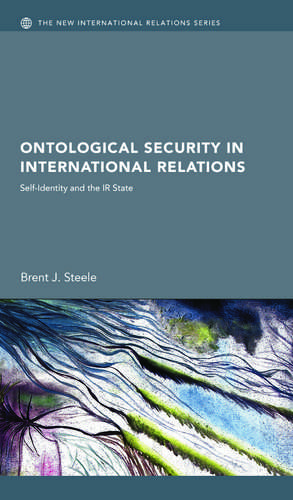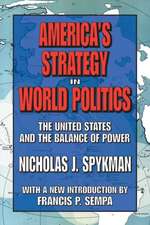Ontological Security in International Relations: Self-Identity and the IR State: New International Relations
Autor Brent J. Steeleen Limba Engleză Paperback – 19 mai 2014
| Toate formatele și edițiile | Preț | Express |
|---|---|---|
| Paperback (1) | 484.47 lei 6-8 săpt. | |
| Taylor & Francis – 19 mai 2014 | 484.47 lei 6-8 săpt. | |
| Hardback (1) | 1165.38 lei 6-8 săpt. | |
| Taylor & Francis – 13 dec 2007 | 1165.38 lei 6-8 săpt. |
Din seria New International Relations
-
 Preț: 385.58 lei
Preț: 385.58 lei -
 Preț: 295.14 lei
Preț: 295.14 lei -
 Preț: 311.41 lei
Preț: 311.41 lei -
 Preț: 416.20 lei
Preț: 416.20 lei -
 Preț: 310.70 lei
Preț: 310.70 lei -
 Preț: 387.58 lei
Preț: 387.58 lei -
 Preț: 280.57 lei
Preț: 280.57 lei - 18%
 Preț: 953.01 lei
Preț: 953.01 lei -
 Preț: 387.16 lei
Preț: 387.16 lei - 18%
 Preț: 1055.51 lei
Preț: 1055.51 lei -
 Preț: 448.86 lei
Preț: 448.86 lei - 18%
 Preț: 1058.79 lei
Preț: 1058.79 lei - 26%
 Preț: 822.54 lei
Preț: 822.54 lei - 15%
 Preț: 434.52 lei
Preț: 434.52 lei -
 Preț: 416.22 lei
Preț: 416.22 lei -
 Preț: 446.53 lei
Preț: 446.53 lei - 26%
 Preț: 819.90 lei
Preț: 819.90 lei - 18%
 Preț: 1167.71 lei
Preț: 1167.71 lei - 18%
 Preț: 1056.71 lei
Preț: 1056.71 lei -
 Preț: 469.64 lei
Preț: 469.64 lei -
 Preț: 412.52 lei
Preț: 412.52 lei - 25%
 Preț: 853.07 lei
Preț: 853.07 lei - 18%
 Preț: 1112.34 lei
Preț: 1112.34 lei -
 Preț: 431.35 lei
Preț: 431.35 lei - 18%
 Preț: 1113.95 lei
Preț: 1113.95 lei - 26%
 Preț: 821.46 lei
Preț: 821.46 lei - 15%
 Preț: 485.91 lei
Preț: 485.91 lei - 18%
 Preț: 1272.54 lei
Preț: 1272.54 lei - 18%
 Preț: 1060.52 lei
Preț: 1060.52 lei - 22%
 Preț: 338.68 lei
Preț: 338.68 lei -
 Preț: 410.50 lei
Preț: 410.50 lei - 18%
 Preț: 1060.52 lei
Preț: 1060.52 lei -
 Preț: 472.82 lei
Preț: 472.82 lei - 18%
 Preț: 1058.79 lei
Preț: 1058.79 lei - 18%
 Preț: 1056.28 lei
Preț: 1056.28 lei - 18%
 Preț: 1118.46 lei
Preț: 1118.46 lei - 18%
 Preț: 1059.84 lei
Preț: 1059.84 lei - 26%
 Preț: 819.32 lei
Preț: 819.32 lei - 18%
 Preț: 1059.84 lei
Preț: 1059.84 lei - 18%
 Preț: 1052.35 lei
Preț: 1052.35 lei
Preț: 484.47 lei
Nou
92.72€ • 96.43$ • 77.59£
Carte tipărită la comandă
Livrare economică 15-29 martie
Specificații
ISBN-10: 0415762154
Pagini: 244
Ilustrații: 1 black & white illustrations, 6 black & white tables, 1 black & white line drawings
Dimensiuni: 156 x 234 x 17 mm
Greutate: 0.34 kg
Ediția:1
Editura: Taylor & Francis
Colecția Routledge
Seria New International Relations
Locul publicării:Oxford, United Kingdom
Cuprins
Notă biografică
Brent J. Steele is an Assistant Professor of Political Science at the University of Kansas, USA.
Recenzii
Luke M. Herrington, E-IR
Descriere
The central assertion of this book is that states pursue social actions to serve self-identity needs, even when these actions compromise their physical existence. Three forms of social action, sometimes referred to as 'motives' of state behaviour (moral, humanitarian, and honour-driven) are analyzed here through an ontological security approach. Brent J. Steele develops an account of social action which interprets these behaviours as fulfilling a nation-state's drive to secure self-identity through time. The anxiety which consumes all social agents motivates them to secure their sense of being, and thus he posits that transformational possibilities exist in the 'Self' of a nation-state. The volume consequently both challenges and complements realist, liberal, constructivist and post-structural accounts to international politics. Using ontological security to interpret three cases - British neutrality during the American Civil War (1861-1865), Belgium's decision to fight Germany in 1914, and NATO's (1999) Kosovo intervention - the book concludes by discussing the importance for self-interrogation in both the study and practice of international relations.Ontological Security in International Relations will be of particular interest to students and researchers of international politics, international ethics, international relations and security studies.

























